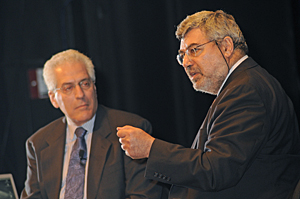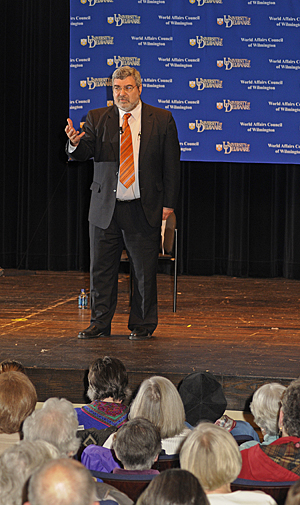
- Rozovsky wins prestigious NSF Early Career Award
- UD students meet alumni, experience 'closing bell' at NYSE
- Newark Police seek assistance in identifying suspects in robbery
- Rivlin says bipartisan budget action, stronger budget rules key to reversing debt
- Stink bugs shouldn't pose problem until late summer
- Gao to honor Placido Domingo in Washington performance
- Adopt-A-Highway project keeps Lewes road clean
- WVUD's Radiothon fundraiser runs April 1-10
- W.D. Snodgrass Symposium to honor Pulitzer winner
- New guide helps cancer patients manage symptoms
- UD in the News, March 25, 2011
- For the Record, March 25, 2011
- Public opinion expert discusses world views of U.S. in Global Agenda series
- Congressional delegation, dean laud Center for Community Research and Service program
- Center for Political Communication sets symposium on politics, entertainment
- Students work to raise funds, awareness of domestic violence
- Equestrian team wins regional championship in Western riding
- Markell, Harker stress importance of agriculture to Delaware's economy
- Carol A. Ammon MBA Case Competition winners announced
- Prof presents blood-clotting studies at Gordon Research Conference
- Sexual Assault Awareness Month events, programs announced
- Stay connected with Sea Grant, CEOE e-newsletter
- A message to UD regarding the tragedy in Japan
- More News >>
- March 31-May 14: REP stages Neil Simon's 'The Good Doctor'
- April 2: Newark plans annual 'wine and dine'
- April 5: Expert perspective on U.S. health care
- April 5: Comedian Ace Guillen to visit Scrounge
- April 6, May 4: School of Nursing sponsors research lecture series
- April 6-May 4: Confucius Institute presents Chinese Film Series on Wednesdays
- April 6: IPCC's Pachauri to discuss sustainable development in DENIN Dialogue Series
- April 7: 'WVUDstock' radiothon concert announced
- April 8: English Language Institute presents 'Arts in Translation'
- April 9: Green and Healthy Living Expo planned at The Bob
- April 9: Center for Political Communication to host Onion editor
- April 10: Alumni Easter Egg-stravaganza planned
- April 11: CDS session to focus on visual assistive technologies
- April 12: T.J. Stiles to speak at UDLA annual dinner
- April 15, 16: Annual UD push lawnmower tune-up scheduled
- April 15, 16: Master Players series presents iMusic 4, China Magpie
- April 15, 16: Delaware Symphony, UD chorus to perform Mahler work
- April 18: Former NFL Coach Bill Cowher featured in UD Speaks
- April 21-24: Sesame Street Live brings Elmo and friends to The Bob
- April 30: Save the date for Ag Day 2011 at UD
- April 30: Symposium to consider 'Frontiers at the Chemistry-Biology Interface'
- April 30-May 1: Relay for Life set at Delaware Field House
- May 4: Delaware Membrane Protein Symposium announced
- May 5: Northwestern University's Leon Keer to deliver Kerr lecture
- May 7: Women's volleyball team to host second annual Spring Fling
- Through May 3: SPPA announces speakers for 10th annual lecture series
- Through May 4: Global Agenda sees U.S. through others' eyes; World Bank president to speak
- Through May 4: 'Research on Race, Ethnicity, Culture' topic of series
- Through May 9: Black American Studies announces lecture series
- Through May 11: 'Challenges in Jewish Culture' lecture series announced
- Through May 11: Area Studies research featured in speaker series
- Through June 5: 'Andy Warhol: Behind the Camera' on view in Old College Gallery
- Through July 15: 'Bodyscapes' on view at Mechanical Hall Gallery
- More What's Happening >>
- UD calendar >>
- Middle States evaluation team on campus April 5
- Phipps named HR Liaison of the Quarter
- Senior wins iPad for participating in assessment study
- April 19: Procurement Services schedules information sessions
- UD Bookstore announces spring break hours
- HealthyU Wellness Program encourages employees to 'Step into Spring'
- April 8-29: Faculty roundtable series considers student engagement
- GRE is changing; learn more at April 15 info session
- April 30: UD Evening with Blue Rocks set for employees
- Morris Library to be open 24/7 during final exams
- More Campus FYI >>
2:39 p.m., March 12, 2009----Rami G. Khouri, the director of the Issam Fares Institute of Public Policy and International Affairs at the American University of Beirut, spoke to a packed house Wednesday night in UD's Mitchell Hall about understanding the many conflicts in the Middle East.
“The reality today is that you have a lot of different conflicts around the Middle East,” Khouri said during the second of the 2009 Global Agenda lecture series, explaining that the main conflict began as one between Arabs and Israelis and then splintered out to include many other conflicts around the region between various groups.
“The difficulty is that not only do you have many different conflicts around the region, with violence practiced by all the main players, but that these conflicts bleed into one another,” Khouri said. “The Arab-Israeli conflict, Syria, Iran, Iraq, Afghanistan, Lebanon, and all the others. It is very difficult to take any one of these conflicts and look at it in isolation because the players themselves don't separate these conflicts.”
Khouri began where he believes the trouble started, with the Arab-Israeli conflict.
Speaking of the conflict, Khouri said it “is the oldest, most destructive and most consequential of all the conflicts that we have in the Middle East.”
Khouri said the involvement of religion in the conflict has caused the nature of the battle to evolve in a troubling way, and that the longer the fighting goes on, the more radical it becomes.
Khouri said he believes peace is possible, but that it is elusive and it will require a much more significant role with regards to mediators.
A second point Khouri spoke about was the conflict between identity and orientation. Khouri went back to the days of colonialism and stressed that, “most of the countries in the Middle East were not created by the will of the people. Most of the countries in the Arab world were created by acts of colonial power, they were not created by the process of self-determination, and they were not created by the process of popular participation.”
This leads to an identity crisis in the Arab world, with some of the people identifying with their Western colonial roots, some identifying with their pre-colonial Arab roots and some identifying with their religious roots, which in itself leads to a religious-secular tension.
Khouri also highlighted the involvement of the Western world in the modern Middle East, pointing out that, “America has exclusively, directly, militarily, economically, culturally, supported one side against another in what is essentially an internal struggle.”
America's involvement only exacerbated the situation in the Middle East, Khouri said, adding, “Every time the U.S. did this, it lost. The side that it supported lost and the other side won.”
This led to the enemies of the United States joining forces, specifically the Iranians and Hamas, he said. “We now have a wider ideological and almost cultural conflict spearheaded by the Americans on one side and the Iranians on the other,” he said.
Khouri also said “the Sunni Shiite problem that we have in the Arab world today is a consequence of the war we have in Iraq, and that is something, historically, that the United States is going to have to come to grips with.”
Khouri finished his speech by focusing on five R's, saying, “I think if we keep in mind rights, reciprocity, resistance, re-birth and respect, it will give us a much better understanding of the realities of this region, and also what are the keys to a possible resolution of some of these issues.”
This talk was part of the 2009 Global Agenda series, “Tinderbox: Understanding the Middle East.” The next one of these lectures will take place at 7:30 p.m., Wednesday, March 25, in Mitchell Hall and the speaker will be Dana Shell Smith, U.S. Foreign Service officer who has served in public diplomacy positions in the Middle East. Smith will speak about, “Dousing the Flames: Public Diplomacy in Action.”
Article by Adam Thomas
Photos by Duane Perry



